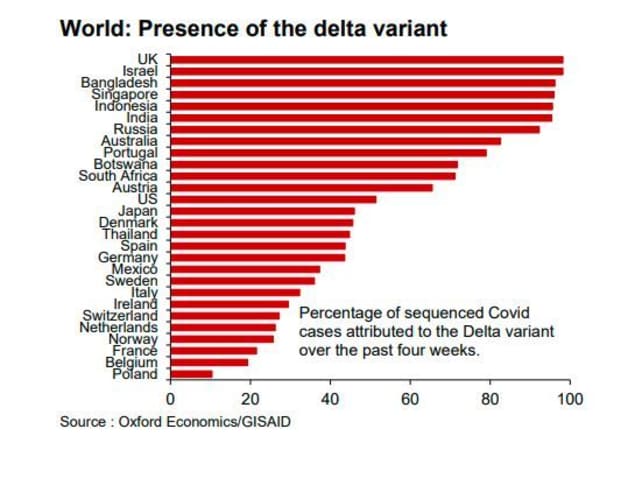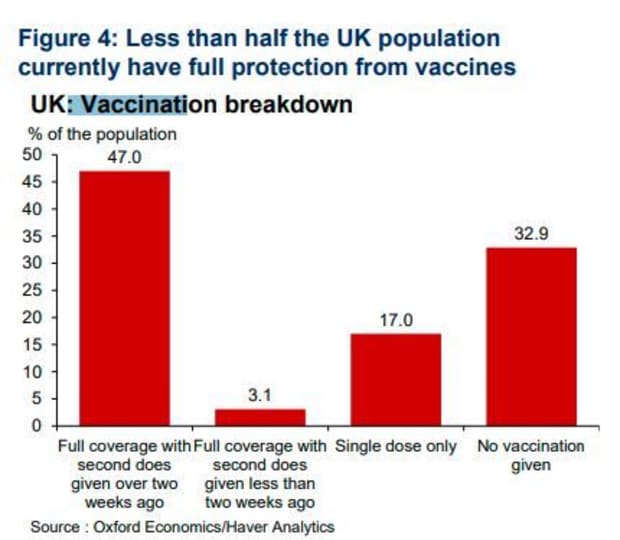This post was originally published on this site
While the highly infectious delta variant of the coronavirus that causes COVID-19 is quickly becoming the dominant strain globally, it so far appears to not have come with a big increase in hospitalizations or death, as seen in Israel and the U.K.
That might lead some to think “exit waves” of infections are a “necessary evil” to reopening economies in countries where the most of the population still hasn’t been vaccinated. Such a strategy carries huge risks, warned Ben May, director of global macro research at Oxford Economics, in a note that published Monday.
“The first is that allowing high cases raises the likelihood of new variants emerging. We expect policy makers to place little weight on this issue and then cross their fingers and hope new variants don’t emerge domestically,” said May. That’s as countries become more focused on preventing the spread to their own economies.
“Such behavior is a classic example of a negative externality — the gains of reopening largely benefit the domestic economy while the costs of a new variant emerging would be borne by the whole world,” said May.

Chart shows economies that have reported more than 100 sequenced cases of the delta variant. In 13, it accounts for over 50% of cases. The number is probably understated in countries that aren’t testing for variants, says Oxford Economics.
May said allowing a surge in cases would also undermine the “positive effect on the economy from looser restrictions.” In other words, it would lead to more people in quarantine and therefore supply-side disruptions, as well as fears of contagion leading to less mobility.
The U.K. government has come under criticism for its plans to relax all restrictions as of July 19, as Prime Minister Boris Johnson argued that it was far better to allow for a surge in cases in summer, when schools are on vacation than in winter, when the virus could have an advantage. Health secretary Sajid Javid has warned that cases averaging about 30,000 a day could climb to 100,000 during the summer.
One scientific model has suggested that, when it does peak, the U.K. outbreak that is being driven by the delta variant will send more than 1,000 people to hospital a day and kill 100 a day. A recent letter signed by more than 120 of the world’s leading scientists has protested the U.K. government’s relaxation strategy and laid out the dangers of that policy.
Oxford Economics’ May said that the current wave of U.K. cases has been driven by the fact that one shot of vaccines such as those from AstraZeneca
AZN,
–Oxford University and Pfizer
PFE,
–BioNTech
BNTX,
provide far less protection against the delta variant.
“At present, about one-third of the U.K. population have not received a vaccine while 17% have had one jab and the remainder have been fully vaccinated,” said May. “Based on all the above figures, vaccinations probably provide the U.K.
population on average between about 40% and 55% protection from the delta variant.”

The economist’s warning came as Tedros Adhanom Ghebreyesus, the World Health Organization’s director-general, on Monday criticized the global vaccine-supply gap as “hugely uneven and inequitable.” At a meeting to discuss boosters with Pfizer, the Food and Drug Administration told the pharmaceutical group, which is working on one aimed at the delta strain, that they were not yet needed.
“Some countries and regions are actually ordering millions of booster doses, before other countries have had supplies to vaccinate their health workers and most vulnerable,” said Ghebreyesus.


